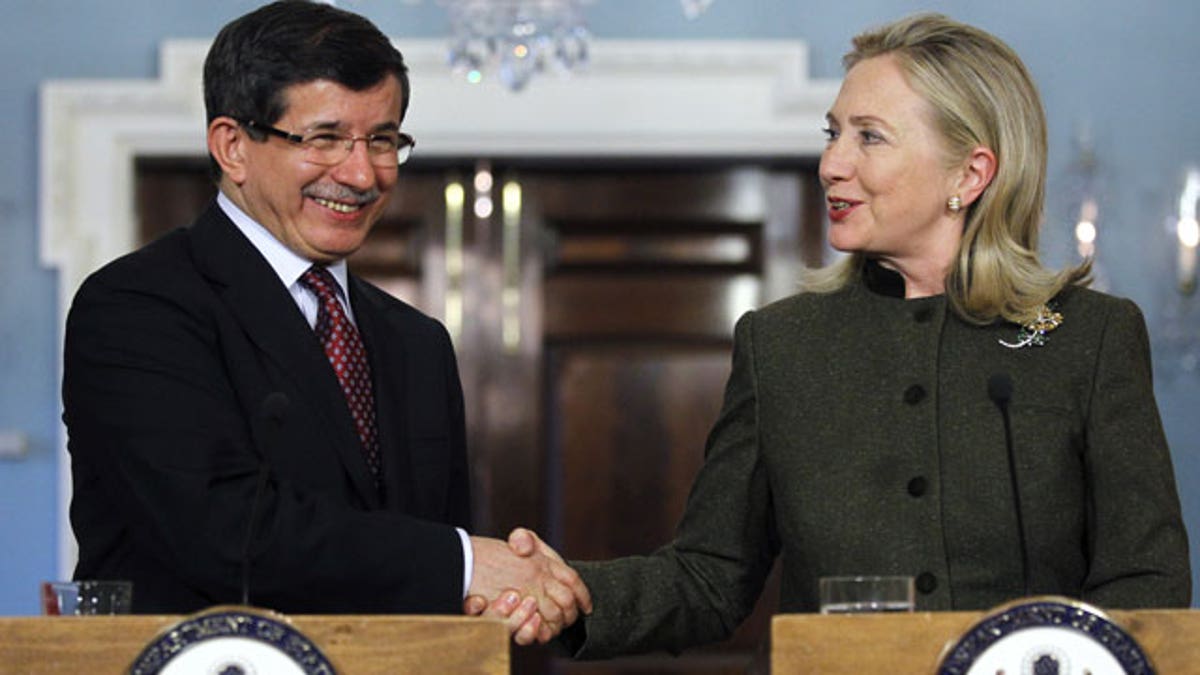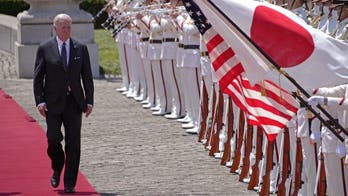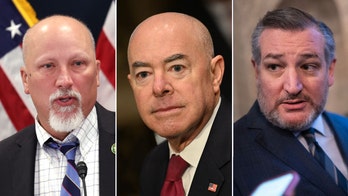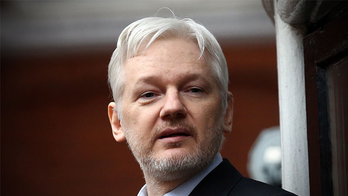
Feb. 13, 2012 Secretary of State Hillary Rodham Clinton and Turkish Foreign Minister Ahmet Davutoglu shake hands during a joint news conference at the Department of State in Washington. (AP)
WASHINGTON – The Obama administration said Monday it backs Arab League plans to end ongoing violence in Syria but noted several obstacles to deploying a proposed international peacekeeping force to the country and stopped short of a full endorsement of the idea.
The administration has said repeatedly it does not see a military solution to the crisis in Syria, yet U.S. officials indicated they would consider the Arab League call for peacekeepers and discuss it with various countries to see whether such an idea is feasible. However, they stressed there would be difficulties in getting required U.N. Security Council authorization for a force.
Chief among the hurdles is opposition by Russia and China, which vetoed a far less ambitious Security Council action earlier this month. Russia has said peacekeepers could not be sent without Syrian government approval; officials in Damascus have already rejected the proposal, calling it unjustified interference in internal affairs.
"We support the Arab League's decisions ... to try to end the violence and move toward a transition," Secretary of State Hillary Rodham Clinton said. "There are a lot of challenges to be discussed as to how to put into effect all of their recommendations. And certainly, the peacekeeping request is one that will take agreement and consensus."
"So, we don't know that it is going to be possible to persuade Syria. They have already as of today rejected that but I think this is what we are trying to explore," Clinton told reporters after meeting with Turkish Foreign Minister Ahmet Davutoglu at the State Department.
At the White House, press secretary Jay Carney said the administration has begun discussions with the U.N., the Arab League and allies about how an eventual peacekeeping force could work. He said nothing about any U.S. participation, but it is unlikely in the near term.
For now, talk of a peacekeeping force is preliminary, and largely theoretical. Carney said the discussion is about how peacekeepers "could help to maintain peace in Syria, starting with there being a peace to keep. "
A Feb. 24 meeting is scheduled in Tunisia of the "Friends of Syria" group that will plot next steps in pressuring Syrian President Bashar Assad's regime to end its brutal crackdown on opponents. Ahead of that meeting, Clinton said the U.S., Turkey and other supporters of the Arab League plan would be discussing ways to support the opposition and expand the delivery of humanitarian supplies to those in need.
Among the topics of discussion will be intensifying sanctions and diplomatic pressure on Assad and his inner circle, greater outreach to regime opponents in and outside of the country and boosting financial contributions to organizations like the International Committee for the Red Cross and Red Crescent that are working in Syria.
Turkey has floated several ideas, including the creation of protected humanitarian corridors to assist civilian victims of the violence. Davutoglu said those remained on the table. But he was not specific.
"We cannot be silent when this humanitarian tragedy is still ongoing," he said.
With diplomatic efforts bogged down, the conflict is taking on the dimensions of a civil war, something Clinton warned against.
"Ultimately, it is going to be important to convince the Assad regime that they are leading Syria into the outcome that we all deplore," she said. "No one wants to see a civil war in Syria."
"So we have to encourage the Assad regime and those who support it to understand that there is either a path toward peacemaking and democratic transition, which is we what we are promoting, or there is a path that leads toward chaos and violence, which we deplore."




